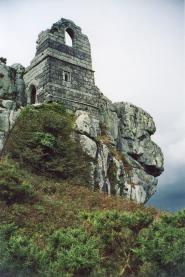POETS OF THE CLAY COUNTRY: A.L. Rowse
Rowse was born in Tregonissey, on the edge of the Clay Country. He wrote short stories, poetry, and an autobiography, which described his views of this region, though he was most well-known outside Cornwall as a historian at Oxford. He described the Clay Country in a short story, ‘The Curse Upon the Clavertons’, as having ‘an extraordinary landscape… empty shells of ruined engine-houses […] pits gradually filling with malevolent green water’. His poems were more likely to celebrate the beauty and peace of St Austell Bay. From 1953 to his death he lived in the grand house on the point at Trenarren and wrote several poems about his garden and cliff walks nearby. However, he did record his responses to some scenes from the “extraordinary landscape”, including in the poem “Bus-ride”:
Extract from ‘Bus-ride’
The bus goes up the valley road
With mounds of gorse on either hand
That burn and blaze amid the brake
And clothe with fire the hills of sand.Sunlight on a grey stone house,
The ivies glitter and catch the light;
The sparse and scattered Cornish trees
Announce Carthew, and now the whiteClaypits on the pock-marked moor;
We pass the granite cottages,
The gardens with a shrub in flower,
The rude and honest villages. [...]
The poem that places Rowse best in the Clay Country is ‘The Road to Roche’. In it he remembers his boyhood among eccentric characters and celebrates his favourite views across to Trenarren and St Austell Bay. He repeats the poetry and music of the local Cornish place names and considers the impact of religion on his community from the medieval hermit of Roche Rock to John Wesley, who preached to the miners in the 18th century. Finally he compares his cheerful, elderly friend with the springtime beauty that flowers, against the odds, in this grim environment.
Extracts from ‘The Road to Roche’
Here is the hard-bitten country of my birth.
In a dank corner between monkey-puzzle and sawpit
Lived, drunken Dick Spargo: how he made a living
I’ve often wondered – occasional cattle-dealing
And his wife’s bit of property, I suppose.
Fridays he’d come rolling home from market,
His breeches as tight, and every variety
Of knobbly stick or cane or switch to brandish,
Long moustaches dripping booze at ends. […]
Higher and higher, mount the last heave of the hill
To where the china-clay country begins:
The pyramids rise pure in colour and line,
On the other hand, the chasms torn in the earth
Vertiginously deep and frightening. […]
The road runs downwards now through china-clay
Villages with ancient rebarbative names:
Scredda, Rescorla, Hallaze and Stenalees,
A hog’s spine of hill mounding the western sky,
Carluddon, Carloggas and Resugga Green,
Penwithick Stents and Treverbyn vean, a tree
Or two in a hollow by the cemetery.
The view to the right across prehistoric moors,
Full of crosses, quoits and standing stones,
Circles and monoliths and dead men’s bones,
To Luxulyan tower suddenly lit by the sun. […]
Enter the last lap, a shallow valley
Of settling-pools, clay-dries and small farms,
Tall chimneys punctuate the tilted slope
To where at the top of the immense, frowning Rock
Of the medieval hermit looms and threatens,
Broken arch of chapel an eyehole at summit,
The eye of a needle the rich may not enter…
Down the descent by cobwalled Rock Inn
To the sombre garden where my ancient friend awaits me,
Eyes as blue as periwinkle in the border,
A rich and warm expressive Cornish voice,
With the crackle in it like foot on autumn leaves,
Smile like the early April sun coming out
Among windswept daffodils, their heads blown,
Spilled cups of gold upon clumps of heather
In this rockbound moorland fastness hemmed about
By all the temerarious flowers of spring.From A Life: Collected Poems by A. L. Rowse (Edinburgh: William Blackwood, 1981)
